|
1. As More Think 'Surge' Working, CBS's Interest in Its Poll Falls
On the day of the long-anticipated report from General David Petraeus on the "surge," the CBS Evening News ignored how its latest poll discovered the third straight month of an increase in the percent of Americans who believe the surge has "made things better" in Iraq. As the percentage has gone up, CBS's interest in the result has gone down. In July, anchor Katie Couric led with how only 19 percent thought the surge was "making things better" and a month later, in August, when that number jumped to 29 percent, CBS and Couric gave it just 12 seconds 20 minutes into the newscast. While Monday's CBS Evening News skipped how the share crediting the surge for "making things better" rose to 35 percent in the survey conducted through Saturday, the newscast found time to highlight three other findings that stressed public opposition to the war and distrust of President Bush. Jim Axelrod relayed how "in the latest CBS News/New York Times poll, just four percent think Iraq will become a stable democracy in the next year or two. More than half [53%] say it'll never happen. And just five percent think the Bush administration best able to make the right calls on the war."
2. ABC's Wright: 100 Percent of Anbar Iraqis Oppose Troop Surge
On Monday's Good Morning America, correspondent David Wright highlighted an ABC poll which claimed a "stunning" 100 percent of Iraqis in Anbar Province view the troop surge negatively. Wright offered this rather amazing statistic during a dour preview of the Iraq progress report that General Petraeus gave Congress later in the day. While discussing the ABC survey of Iraqi households, Wright didn't question the fact that not one person could be found who viewed the troop surge positively. After comparing Petraeus's testimony to that of General William Westmoreland at the height of the Vietnam War, Wright went on to discuss how the poll indicates that Iraqis believe the prospects for the future are "grim at best." He then closed the report by stating the obvious: Unlike ABC, General Petraeus will actually mention signs of progress, in addition to discussing the struggles. "And no doubt we're going to be hearing a starkly different assessment today from this chair by General Petraeus," he concluded.
3. NY Times Worries Over Giuliani's 'Political Exploitation' of 9/11
The New York Times seems determined to limit any political gains Republican Rudy Giuliani gets for 9-11: Marc Santora's Monday "Political Memo" titled, "In Campaign Year, Invoking 9/11 Raises New Debates," suggested Giuliani is misleading voters by breaking some kind of promise not to talk about his leadership as mayor of New York City after the September 11 terrorist attacks: "[T]here have been renewed questions about the fuzzy line between somber remembrance and political exploitation...." But did the Times show similar concern when John Kerry exploited his Vietnam service during 2004?
4. Roker Praises Liberal Actress Susan Sarandon as 'Good Role Model'
NBC's Today show co-host and weatherman Al Roker invited on Susan Sarandon to promote her latest movie, Mr. Woodcock, but couldn't get through the full interview Monday without praising her liberal activism, as he called her a "good role model," and celebrated her "great job" of combining acting and protesting. For her part, Sarandon actually took a dig at NBC News on its own airwaves as she wistfully recalled the good old days when "news programs" showed "what was going on, not like now."
 As More Think 'Surge' Working, CBS's As More Think 'Surge' Working, CBS's
Interest in Its Poll Falls
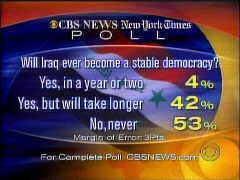 On the day of the long-anticipated report from General David Petraeus on the "surge," the CBS Evening News ignored how its latest poll discovered the third straight month of an increase in the percent of Americans who believe the surge has "made things better" in Iraq. As the percentage has gone up, CBS's interest in the result has gone down. In July, anchor Katie Couric led with how only 19 percent thought the surge was "making things better" and a month later, in August, when that number jumped to 29 percent, CBS and Couric gave it just 12 seconds 20 minutes into the newscast..
On the day of the long-anticipated report from General David Petraeus on the "surge," the CBS Evening News ignored how its latest poll discovered the third straight month of an increase in the percent of Americans who believe the surge has "made things better" in Iraq. As the percentage has gone up, CBS's interest in the result has gone down. In July, anchor Katie Couric led with how only 19 percent thought the surge was "making things better" and a month later, in August, when that number jumped to 29 percent, CBS and Couric gave it just 12 seconds 20 minutes into the newscast..
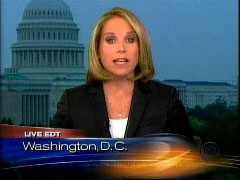 While Monday's CBS Evening News skipped how the share crediting the surge for "making things better" rose to 35 percent in the survey conducted through Saturday, the newscast found time to highlight three other findings that stressed public opposition to the war and distrust of President Bush. Jim Axelrod relayed how "in the latest CBS News/New York Times poll, just four percent think Iraq will become a stable democracy in the next year or two. More than half [53%] say it'll never happen. [On screen: Yes, but it will take longer: 42%] And just five percent think the Bush administration best able to make the right calls on the war. [Congress: 21%; U.S. military commanders: 68%]." A bumper before the first ad break showcased how on "U.S. troop levels in Iraq," 30 percent said they "should increase/keep the same," while 65 percent responded they "should decrease/remove all."
While Monday's CBS Evening News skipped how the share crediting the surge for "making things better" rose to 35 percent in the survey conducted through Saturday, the newscast found time to highlight three other findings that stressed public opposition to the war and distrust of President Bush. Jim Axelrod relayed how "in the latest CBS News/New York Times poll, just four percent think Iraq will become a stable democracy in the next year or two. More than half [53%] say it'll never happen. [On screen: Yes, but it will take longer: 42%] And just five percent think the Bush administration best able to make the right calls on the war. [Congress: 21%; U.S. military commanders: 68%]." A bumper before the first ad break showcased how on "U.S. troop levels in Iraq," 30 percent said they "should increase/keep the same," while 65 percent responded they "should decrease/remove all."
PDF of the results of the poll conducted September 4-8: www.cbsnews.com
The August 14 CyberAlert revealed:
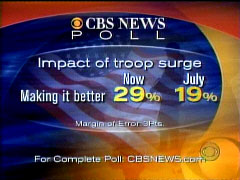 When a CBS News poll in July found 73 percent believed the surge of troops in Iraq was making the situation "worse" or having "no impact," the CBS Evening News led with that number. But on Monday, when a new CBS poll discovered that percent had fallen 12 points to 61 percent, as the percent who think the surge is making the situation "better" jumped ten points from 19 to 29 percent, CBS gave it 12 seconds 20 minutes into the newscast. "Major attacks decline in Iraq: Military credits troop increase, civilian tipsters," declared the headline at the top of Monday's USA Today front page. Katie Couric, however, ignored that report and, after briefly relaying the new poll number, couldn't resist highlighting "one thing that hasn't changed, two-thirds say that, overall, things are still going badly in Iraq." When a CBS News poll in July found 73 percent believed the surge of troops in Iraq was making the situation "worse" or having "no impact," the CBS Evening News led with that number. But on Monday, when a new CBS poll discovered that percent had fallen 12 points to 61 percent, as the percent who think the surge is making the situation "better" jumped ten points from 19 to 29 percent, CBS gave it 12 seconds 20 minutes into the newscast. "Major attacks decline in Iraq: Military credits troop increase, civilian tipsters," declared the headline at the top of Monday's USA Today front page. Katie Couric, however, ignored that report and, after briefly relaying the new poll number, couldn't resist highlighting "one thing that hasn't changed, two-thirds say that, overall, things are still going badly in Iraq."
Couric had led the July 18 CBS Evening News: "In a CBS News/New York Times poll out tonight, nearly three out of four Americans say the troop surge is not working, that it's having no impact, or actually making matters worse." On Monday [August 13], she acknowledged: "Americans are starting to come around on that troop surge in Iraq. In our CBS News poll out tonight, 29 percent say the surge is making things better. That's a ten point increase since July." It's doubtful the ten percent who have come around are consumers of CBS or other mainstream media outlets which concentrate on the negative.
The July 19 CyberAlert item recounted how Couric led that night's CBS Evening News:
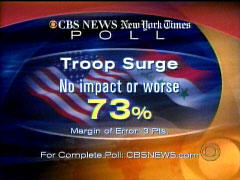 "Hello, everyone. Senate Democrats failed today in their latest attempt to bring American troops home from Iraq. After a rare, all-night debate, they couldn't come up with the votes today to bring the latest troop withdrawal measure to the floor. And that is in spite of pressure from the voters themselves. In a CBS News/New York Times poll out tonight, nearly three out of four Americans say the troop surge is not working, that it's having no impact, or actually making matters worse. And nearly two out of three want the President to bring some or all U.S. forces home." "Hello, everyone. Senate Democrats failed today in their latest attempt to bring American troops home from Iraq. After a rare, all-night debate, they couldn't come up with the votes today to bring the latest troop withdrawal measure to the floor. And that is in spite of pressure from the voters themselves. In a CBS News/New York Times poll out tonight, nearly three out of four Americans say the troop surge is not working, that it's having no impact, or actually making matters worse. And nearly two out of three want the President to bring some or all U.S. forces home."
END of Excerpt
For the August 14 CyberAlert: www.mediaresearch.org
For the July 19 CyberAlert: www.mrc.org
  ABC's Wright: 100 Percent of Anbar Iraqis ABC's Wright: 100 Percent of Anbar Iraqis
Oppose Troop Surge
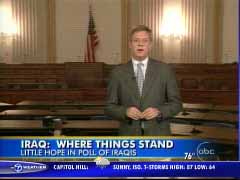 On Monday's Good Morning America, correspondent David Wright highlighted an ABC poll which claimed a "stunning" 100 percent of Iraqis in Anbar Province view the troop surge negatively. Wright offered this rather amazing statistic during a dour preview of the Iraq progress report that General Petraeus gave Congress later in the day. In October of 2002, the veteran journalist highlighted another nearly unanimous poll. He observed on World News Tonight that in a 1995 Iraqi election, "Saddam Hussein won 99.96 percent of the vote. Of course, it is impossible to say whether that's a true measure of the Iraqi people's feelings." See the October 17, 2002 CyberAlert: www.mediaresearch.org
On Monday's Good Morning America, correspondent David Wright highlighted an ABC poll which claimed a "stunning" 100 percent of Iraqis in Anbar Province view the troop surge negatively. Wright offered this rather amazing statistic during a dour preview of the Iraq progress report that General Petraeus gave Congress later in the day. In October of 2002, the veteran journalist highlighted another nearly unanimous poll. He observed on World News Tonight that in a 1995 Iraqi election, "Saddam Hussein won 99.96 percent of the vote. Of course, it is impossible to say whether that's a true measure of the Iraqi people's feelings." See the October 17, 2002 CyberAlert: www.mediaresearch.org
While discussing the ABC survey of Iraqi households, Wright didn't question the fact that not one person could be found who viewed the troop surge positively. After comparing Petraeus's testimony to that of General William Westmoreland at the height of the Vietnam War, Wright went on to discuss how the poll indicates that Iraqis believe the prospects for the future are "grim at best." He then closed the report by stating the obvious: Unlike ABC, General Petraeus will actually mention signs of progress, in addition to discussing the struggles. "And no doubt we're going to be hearing a starkly different assessment today from this chair by General Petraeus," he concluded.
[This item, by Scott Whitlock, was posted Monday afternoon on the MRC's blog, NewsBusters.org: newsbusters.org ]
A transcript of the segment, which aired at 7:03am on September 10:
Robin Roberts: "But we begin with the report on Iraq. As we said, General Petraeus begins his testimony on the hill later today. He is expected to recommend any decisions on troop withdrawal, any major decisions, be put off for six months. ABC's David Wright is in the hearing room where General Petraeus will testify later today. Good morning, David."
David Wright: "Good morning, Robin. The headline here this morning is that General Petraeus is expected to ask for a delay until next March or April before even considering any major reductions in the main body of U.S. forces in Iraq. However, he's likely to recommend the pullback of at least one brigade, about 4,000 men, by year's end, sort of a token reduction, and the possibility of another 4,000 troops at the beginning of next year. But he says any major cuts have to be determined by the situation on the ground in Iraq. The question is, will that enough to convince the skeptics here in Congress that really want to see the troops come home? Pleading for more time in Iraq, the White House has pinned its hopes on the general. Not since the height of the Vietnam War, when the Johnson administration summoned General William Westmoreland-"
Gen. William Westmoreland, April 1967: "One cannot measure progress by lines on a map."
David Wright: "-to buy another six years for that war, has so much been riding on the persuasive powers of a single military man. President Bush paved the way dramatically last week with his surprise visit to an air base in Anbar, Iraq."
President George W. Bush: "It is now one of the safest places in Iraq."
Wright: "But members of Congress are understandably skeptical."
David Walker, Comptroller General, Government Accountability Office: "There is no question there is progress in Anbar Province. But Anbar Province is not Baghdad."
 Wright: "Iraqis share that skepticism according to a new ABC News poll conducted face to face in more than 2,200 households around Iraq. 47 percent of Iraqis, a plurality, now favor an immediate pullout of U.S. troops. Barely a quarter say their security has improved. 65 to 70 percent of Iraqis say the surge has actually made things worse. In Baghdad, and even in Anbar, a stunning review. Responses about the surge were 100 percent negative. Iraqis are losing confidence in the national government, too. And most say living conditions are now worse than before the war. Prospects for the future? Grim at best. Fewer than one out of three Iraqis expect their lives to get better next year. And just one third think their children will have a better life than they do. And no doubt we're going to be hearing a starkly different assessment today from this chair by General Petraeus. Diane?" Wright: "Iraqis share that skepticism according to a new ABC News poll conducted face to face in more than 2,200 households around Iraq. 47 percent of Iraqis, a plurality, now favor an immediate pullout of U.S. troops. Barely a quarter say their security has improved. 65 to 70 percent of Iraqis say the surge has actually made things worse. In Baghdad, and even in Anbar, a stunning review. Responses about the surge were 100 percent negative. Iraqis are losing confidence in the national government, too. And most say living conditions are now worse than before the war. Prospects for the future? Grim at best. Fewer than one out of three Iraqis expect their lives to get better next year. And just one third think their children will have a better life than they do. And no doubt we're going to be hearing a starkly different assessment today from this chair by General Petraeus. Diane?"
  NY Times Worries Over Giuliani's 'Political NY Times Worries Over Giuliani's 'Political
Exploitation' of 9/11
The New York Times seems determined to limit any political gains Republican Rudy Giuliani gets for 9-11: Marc Santora's Monday "Political Memo" titled, "In Campaign Year, Invoking 9/11 Raises New Debates," suggested Giuliani is misleading voters by breaking some kind of promise not to talk about his leadership as mayor of New York City after the September 11 terrorist attacks: "[T]here have been renewed questions about the fuzzy line between somber remembrance and political exploitation...." But did the Times show similar concern when John Kerry exploited his Vietnam service during 2004?
[This item is adapted from a posting, by Clay Waters, on the MRC's TimesWatch site: www.timeswatch.org ]
An excerpt from the Monday article:
During a Republican presidential debate on Wednesday, Rudolph W. Giuliani asserted, "The reality is that I'm not running on what I did on Sept. 11."
Two days later, a crowd of nearly 1,000 filed into a ballroom here for a 9/11 Remembrance Luncheon. Graphic images of the exploding towers, dust-covered survivors and even a series of photos that showed someone leaping from a tower were flashed on two giant screens flanking the stage where Mr. Giuliani was about to speak.
"America must never forget the lessons of Sept. 11," Mr. Giuliani, the former New York City mayor, later told the crowd.
As the anniversary of the attacks nears, Mr. Giuliani has been talking in more personal detail than usual about that day. In so doing, there have been renewed questions about the fuzzy line between somber remembrance and political exploitation, this time amplified by his presidential candidacy.
END of Excerpt
For the September 10 piece by Marc Santora: www.nytimes.com
But where were these complaints about "exploitation" when Democrat John Kerry milked his three months in Vietnam for all it was worth -- a period far less relevant to the electorate than Giuliani's 9-11 leadership?
(Back in 2002, future candidate Kerry told Times columnist and future Times Executive Editor Bill Keller that he had "no intention" of using film footage he'd taken of himself in Vietnam for campaign purposes. Kerry did, of course. Not only did the Times not call the candidate on this, the paper seemed to find it distasteful when TimesWatch brought it up. See: www.timeswatch.org )
More from Santora on Monday:
"Mr. Giuliani's aides acknowledge that there is a line that should not be crossed -- although their definition of that line is probably different from that of his opponents. And recently, his invoking of Sept. 11 has boomeranged, as others have raised questions about his claims of being at ground zero more than rescue workers who have said their exposure to the site made them ill."
By contrast, the Times didn't suggest Kerry's Vietnam boasting had "boomeranged" when the Swift Boat Veterans for Truth started poking holes in his medal citations. Instead, the Times constantly blasted the allegations from the Swift Boat Veterans as "unsubstantiated," while never questioning Kerry's war record or medals. See: www.timeswatch.org
Of course, the Times is quite comfortable questioning Giuliani's 9-11 leadership. See the August 17 TimesWatch posting, "Times Questions Giuliani's 9-11 Presence -- Yet Never Challenged Kerry's Vietnam Stories," online at: www.timeswatch.org
Santora asserted:
"When the Republicans held their nominating convention in New York City in 2004, the party swathed itself in Sept. 11 imagery, and Mr. Giuliani gave a speech that mixed his experiences that day with a broadside attack on the Democratic nominee, Senator John Kerry. While Democrats complained about what they saw as a blatant exploitation of the attacks, few prominent figures criticized Mr. Giuliani directly....And while Mr. Giuliani has been a regular presence at past Sept. 11 commemorations at ground zero, his plan to attend this year has drawn criticism from some survivors and relatives of victims who have raised questions about his leadership both before and after the attacks."
  Roker Praises Liberal Actress Susan Sarandon Roker Praises Liberal Actress Susan Sarandon
as 'Good Role Model'
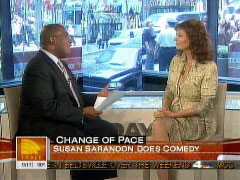 NBC's Today show co-host and weatherman Al Roker invited on Susan Sarandon to promote her latest movie, Mr. Woodcock, but couldn't get through the full interview Monday without praising her liberal activism, as he called her a "good role model," and celebrated her "great job" of combining acting and protesting. For her part, Sarandon actually took a dig at NBC News on its own airwaves as she wistfully recalled the good old days when "news programs" showed "what was going on, not like now."
NBC's Today show co-host and weatherman Al Roker invited on Susan Sarandon to promote her latest movie, Mr. Woodcock, but couldn't get through the full interview Monday without praising her liberal activism, as he called her a "good role model," and celebrated her "great job" of combining acting and protesting. For her part, Sarandon actually took a dig at NBC News on its own airwaves as she wistfully recalled the good old days when "news programs" showed "what was going on, not like now."
[This item, by Geoffrey Dickens, was posted Monday afternoon on the MRC's blog, NewsBusters.org: newsbusters.org ]
The following is the relevant out-take from the Sarandon interview as it took place on the September 10 Today show:
Al Roker: "Well you know, you've had this great career, you do these great films and yet you also, you're able to combine that with, with, with activism. Is that just as important to you as, as a good script?"
Susan Sarandon: "You know, in my job, it's all about imagination, imagination leads to empathy and empathy leads to activism. So I mean, I was, I came of age at that time when, you know, I was in D.C. growing up and you know if you had half-a-brain in your head and half-a-heart you were active, so it's nothing that started recently. It's just that people now, either hate me for it or like me for it, but it's because now people notice me, specifically. But it's something, I think, you know my generation, I'm so much older than you."
Roker: "Oh hardly."
Sarandon: "But in the late '60s, early '70s, you know, you felt you could change things. You stopped a war that, you know, there was segregation in the South. I mean, you had news programs, that you actually saw what was going on, not like now where you don't see things that are happening and, so you know, it made perfect sense that you thought you could change things and you had a responsibility to do that and I hope my kids feel the same way. You know I'm just doing what Americans are supposed to do, just being a human being, that's all."
Al Roker: "Well they've got a good role model."
Sarandon: "Thanks."
Roker: "And you've done a great job of combining the two."
Sarandon: "Thanks."
Roker: "Susan Sarandon, thanks so much."
To see Sarandon's full filmography, visit: www.imdb.com
To read more about Sarandon's latest movie: www.imdb.com
-- Brent Baker

Home | News Division
| Bozell Columns | CyberAlerts
Media Reality Check | Notable Quotables | Contact
the MRC | Subscribe
|





















 On the day of the long-anticipated report from General David Petraeus on the "surge," the CBS Evening News ignored how its latest poll discovered the third straight month of an increase in the percent of Americans who believe the surge has "made things better" in Iraq. As the percentage has gone up, CBS's interest in the result has gone down. In July, anchor Katie Couric led with how only 19 percent thought the surge was "making things better" and a month later, in August, when that number jumped to 29 percent, CBS and Couric gave it just 12 seconds 20 minutes into the newscast..
On the day of the long-anticipated report from General David Petraeus on the "surge," the CBS Evening News ignored how its latest poll discovered the third straight month of an increase in the percent of Americans who believe the surge has "made things better" in Iraq. As the percentage has gone up, CBS's interest in the result has gone down. In July, anchor Katie Couric led with how only 19 percent thought the surge was "making things better" and a month later, in August, when that number jumped to 29 percent, CBS and Couric gave it just 12 seconds 20 minutes into the newscast..  While Monday's CBS Evening News skipped how the share crediting the surge for "making things better" rose to 35 percent in the survey conducted through Saturday, the newscast found time to highlight three other findings that stressed public opposition to the war and distrust of President Bush. Jim Axelrod relayed how "in the latest CBS News/New York Times poll, just four percent think Iraq will become a stable democracy in the next year or two. More than half [53%] say it'll never happen. [On screen: Yes, but it will take longer: 42%] And just five percent think the Bush administration best able to make the right calls on the war. [Congress: 21%; U.S. military commanders: 68%]." A bumper before the first ad break showcased how on "U.S. troop levels in Iraq," 30 percent said they "should increase/keep the same," while 65 percent responded they "should decrease/remove all."
While Monday's CBS Evening News skipped how the share crediting the surge for "making things better" rose to 35 percent in the survey conducted through Saturday, the newscast found time to highlight three other findings that stressed public opposition to the war and distrust of President Bush. Jim Axelrod relayed how "in the latest CBS News/New York Times poll, just four percent think Iraq will become a stable democracy in the next year or two. More than half [53%] say it'll never happen. [On screen: Yes, but it will take longer: 42%] And just five percent think the Bush administration best able to make the right calls on the war. [Congress: 21%; U.S. military commanders: 68%]." A bumper before the first ad break showcased how on "U.S. troop levels in Iraq," 30 percent said they "should increase/keep the same," while 65 percent responded they "should decrease/remove all."  When a CBS News poll in July found 73 percent believed the surge of troops in Iraq was making the situation "worse" or having "no impact," the CBS Evening News led with that number. But on Monday, when a new CBS poll discovered that percent had fallen 12 points to 61 percent, as the percent who think the surge is making the situation "better" jumped ten points from 19 to 29 percent, CBS gave it 12 seconds 20 minutes into the newscast. "Major attacks decline in Iraq: Military credits troop increase, civilian tipsters," declared the headline at the top of Monday's USA Today front page. Katie Couric, however, ignored that report and, after briefly relaying the new poll number, couldn't resist highlighting "one thing that hasn't changed, two-thirds say that, overall, things are still going badly in Iraq."
When a CBS News poll in July found 73 percent believed the surge of troops in Iraq was making the situation "worse" or having "no impact," the CBS Evening News led with that number. But on Monday, when a new CBS poll discovered that percent had fallen 12 points to 61 percent, as the percent who think the surge is making the situation "better" jumped ten points from 19 to 29 percent, CBS gave it 12 seconds 20 minutes into the newscast. "Major attacks decline in Iraq: Military credits troop increase, civilian tipsters," declared the headline at the top of Monday's USA Today front page. Katie Couric, however, ignored that report and, after briefly relaying the new poll number, couldn't resist highlighting "one thing that hasn't changed, two-thirds say that, overall, things are still going badly in Iraq."  "Hello, everyone. Senate Democrats failed today in their latest attempt to bring American troops home from Iraq. After a rare, all-night debate, they couldn't come up with the votes today to bring the latest troop withdrawal measure to the floor. And that is in spite of pressure from the voters themselves. In a CBS News/New York Times poll out tonight, nearly three out of four Americans say the troop surge is not working, that it's having no impact, or actually making matters worse. And nearly two out of three want the President to bring some or all U.S. forces home."
"Hello, everyone. Senate Democrats failed today in their latest attempt to bring American troops home from Iraq. After a rare, all-night debate, they couldn't come up with the votes today to bring the latest troop withdrawal measure to the floor. And that is in spite of pressure from the voters themselves. In a CBS News/New York Times poll out tonight, nearly three out of four Americans say the troop surge is not working, that it's having no impact, or actually making matters worse. And nearly two out of three want the President to bring some or all U.S. forces home." 
 On Monday's Good Morning America, correspondent David Wright highlighted an ABC poll which claimed a "stunning" 100 percent of Iraqis in Anbar Province view the troop surge negatively. Wright offered this rather amazing statistic during a dour preview of the Iraq progress report that General Petraeus gave Congress later in the day. In October of 2002, the veteran journalist highlighted another nearly unanimous poll. He observed on World News Tonight that in a 1995 Iraqi election, "Saddam Hussein won 99.96 percent of the vote. Of course, it is impossible to say whether that's a true measure of the Iraqi people's feelings." See the October 17, 2002 CyberAlert:
On Monday's Good Morning America, correspondent David Wright highlighted an ABC poll which claimed a "stunning" 100 percent of Iraqis in Anbar Province view the troop surge negatively. Wright offered this rather amazing statistic during a dour preview of the Iraq progress report that General Petraeus gave Congress later in the day. In October of 2002, the veteran journalist highlighted another nearly unanimous poll. He observed on World News Tonight that in a 1995 Iraqi election, "Saddam Hussein won 99.96 percent of the vote. Of course, it is impossible to say whether that's a true measure of the Iraqi people's feelings." See the October 17, 2002 CyberAlert:  Wright: "Iraqis share that skepticism according to a new ABC News poll conducted face to face in more than 2,200 households around Iraq. 47 percent of Iraqis, a plurality, now favor an immediate pullout of U.S. troops. Barely a quarter say their security has improved. 65 to 70 percent of Iraqis say the surge has actually made things worse. In Baghdad, and even in Anbar, a stunning review. Responses about the surge were 100 percent negative. Iraqis are losing confidence in the national government, too. And most say living conditions are now worse than before the war. Prospects for the future? Grim at best. Fewer than one out of three Iraqis expect their lives to get better next year. And just one third think their children will have a better life than they do. And no doubt we're going to be hearing a starkly different assessment today from this chair by General Petraeus. Diane?"
Wright: "Iraqis share that skepticism according to a new ABC News poll conducted face to face in more than 2,200 households around Iraq. 47 percent of Iraqis, a plurality, now favor an immediate pullout of U.S. troops. Barely a quarter say their security has improved. 65 to 70 percent of Iraqis say the surge has actually made things worse. In Baghdad, and even in Anbar, a stunning review. Responses about the surge were 100 percent negative. Iraqis are losing confidence in the national government, too. And most say living conditions are now worse than before the war. Prospects for the future? Grim at best. Fewer than one out of three Iraqis expect their lives to get better next year. And just one third think their children will have a better life than they do. And no doubt we're going to be hearing a starkly different assessment today from this chair by General Petraeus. Diane?" 

 NBC's Today show co-host and weatherman Al Roker invited on Susan Sarandon to promote her latest movie, Mr. Woodcock, but couldn't get through the full interview Monday without praising her liberal activism, as he called her a "good role model," and celebrated her "great job" of combining acting and protesting. For her part, Sarandon actually took a dig at NBC News on its own airwaves as she wistfully recalled the good old days when "news programs" showed "what was going on, not like now."
NBC's Today show co-host and weatherman Al Roker invited on Susan Sarandon to promote her latest movie, Mr. Woodcock, but couldn't get through the full interview Monday without praising her liberal activism, as he called her a "good role model," and celebrated her "great job" of combining acting and protesting. For her part, Sarandon actually took a dig at NBC News on its own airwaves as she wistfully recalled the good old days when "news programs" showed "what was going on, not like now."